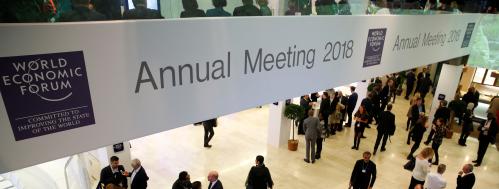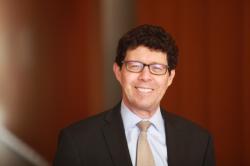This op-ed was originally published by The Hill.
President Donald Trump’s visit to Davos this week adds to the unpredictable narrative of his presidency. Trump’s governing philosophy is captured in the phrase “America First,” providing a stark contrast to that of the World Economic Forum (WEF), which operates under the slogan, “committed to improving the state of the world.” But, for all the dissonance of Trump’s speaking at a forum he has previously demonized, the most likely scenario is that the speech goes off without much controversy and, even more likely, without disrupting the flow of the world’s greatest party.
The WEF Annual Meeting in Davos is known as the world’s most exclusive gathering, attended by heads of state, financiers, bankers, CEO’s, policy experts, and journalists. Anyone and everyone who is there is “somebody.” It is networking nirvana. And there are parties all day and all night, on and off site, large and small, hosted by countries, companies, and banks.
In the main halls, there are speeches by political leaders. It has been 18 years since the last sitting U.S. president came to Davos. Then, it was Bill Clinton, who personified the Davos globalization agenda.
Last year, Chinese President Xi Jin Ping attended and gave the speech that everyone was talking about. It was the first time a Chinese leader had ever attended Davos. Xi used the opportunity to try to provide reassurance to those in attendance that, in spite of the uncertainties around the election of Donald Trump, whose agenda seemed to explicitly advocate the disruption of that very world order, China was ready to provide ballast to the multilateral, pluralistic, liberal, free-market world order.
The irony of the leader of one-party, communist China, whose economic model is based on state intervention in the economy and where freedom of the press and human rights are strictly controlled, providing succor to the attendees was not lost on the audience.
But the fears of Trump’s presidency were so great that Chinese expressions of support for the status quo were widely welcomed.
This year, it will be Donald Trump who takes center stage. There are optimistic expectations that President Trump will seek to challenge last year’s implicit invitation by Xi for the global elite to embrace China’s worldview and that he will make the case for continued U.S. primacy in anchoring and leading the world order.
There are also pessimistic expectations that Trump will use the pulpit to reinforce his “America First” narrative and thumb his nose at the attendees and the elitism that they represent and that his political base rejects.
The gap between “America First” and “committed to improving the state of the world” is very wide.
I expect Trump will use the opportunity to both make the case for U.S. leadership and to criticize and challenge what he sees as unfairness and hypocrisy of the status quo. He is likely to argue that a resurgent, growing U.S. economy is not only good for the U.S., but that U.S. growth spurs global growth, which is good for everyone.
Unlike his domestic rhetoric, which is largely based on the zero-sum, binary principle of winners and losers, Trump may well acknowledge that not only does the rest of the world benefit from a strong U.S., but that the U.S. also benefits from an economically strong rest of the world.
Just by acknowledging that the fortunes of the U.S. and the rest of the world are interlinked, it will be seen as a triumph of the spirit of Davos. I also expect Trump to acknowledge that there are some benefits to the existing multilateral system of trade, governance, and diplomacy, which would be seen as a big step for the public posture of the president.
However, he will likely argue that these systems and institutions only work if those participating in them play by the rules, and that many countries have not done so. In particular, I expect Trump to call out China, either by name or through thinly veiled rhetoric.
I anticipate Trump makes the case that last year’s speech by President Xi was based on the fiction that China can replace the U.S. as the keeper of a multilateral system, when it has been China itself that has been the most glaring “bad actor” in breaking the rules of that system, in particular in the area of trade.
He may also use the forum to raise hostile threats against North Korea, take digs at Mexico and Canada for failing to capitulate to U.S. demands in NAFTA negotiations or threaten further action against Iran; or not.
Donald Trump at Davos is such an inherently odd pairing that it is impossible to really predict what he will do once he is on the stage, speaking to the very crowd that has generally shunned him and that some would argue he has always aspired to join.
Beyond the headline speech, President Trump is not likely to engage in the sideline networking that is really at the heart of Davos. The “schmoozing” that he used to love in his pre-political days in New York City would be ideal for Davos, but it seems unlikely that he will wade into the Davos social scene. Nor do I expect him to make any political breakthroughs on the sidelines in meetings with other world leaders or business titans. The U.S. delegation is heavy on trade officials, but I do not expect any breakthroughs there either. If anything, the week’s interactions may provide a sense of the limits of U.S. unilateralism.
Attendees at this year’s Davos event will likely pay attention to Donald Trump, but the event will not be all about Donald Trump. Business and political deals will get done, crucial contacts will be made, cutting edge technologies will be showcased, experts will opine on fascinating topics, and parties will continue through the snowy nights in the Swiss Alps. But, I expect Donald Trump and his team to be largely absent from the bulk of the action.
It will be hard to reconcile the appearance of this president, even on best behavior, with the man who ran against Hillary Clinton and the Democrats, who he and his advisers disparagingly called the “party of Davos.”
Klaus Schwab, the founder of the WEF, has already sought to calm concerns about Trump’s appearance by calling for critics to keep an open mind and try to use Trump’s Davos appearance as a way to provide the president with a global perspective.
He may be right. Donald Trump’s attendance could somehow inform him of the perspectives of the rest of the world. But, I doubt it. The gap between “America First” and “committed to improving the state of the world” is very wide.
Attendees, many of whom paid enormous sums to be in Davos, are not likely to let Donald Trump derail their party. The most likely outcome may be that Trump attends, makes the case for his agenda, and the Davos elites neither embrace nor reject the outreach, but largely ignore the effort and go on with their Davos activities regardless.
There is nothing Donald Trump will hate more than to be seen as irrelevant.





Commentary
Op-edThe rich and powerful won’t let Trump ruin their Davos party
January 24, 2018